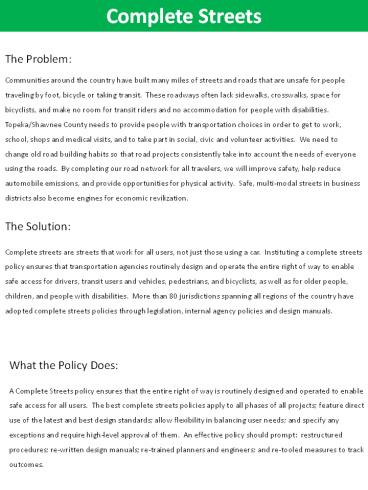Complete Streets - PowerPoint PPT Presentation
1 / 2
Title:
Complete Streets
Description:
... no room for transit riders and no accommodation for people with disabilities. ... We need to change old road building habits so that road projects consistently ... – PowerPoint PPT presentation
Number of Views:209
Avg rating:3.0/5.0
Title: Complete Streets
1
Complete Streets
The Problem
Communities around the country have built many
miles of streets and roads that are unsafe for
people traveling by foot, bicycle or taking
transit. These roadways often lack sidewalks,
crosswalks, space for bicyclists, and make no
room for transit riders and no accommodation for
people with disabilities. Topeka/Shawnee County
needs to provide people with transportation
choices in order to get to work, school, shops
and medical visits, and to take part in social,
civic and volunteer activities. We need to
change old road building habits so that road
projects consistently take into account the needs
of everyone using the roads. By completing our
road network for all travelers, we will improve
safety, help reduce automobile emissions, and
provide opportunities for physical activity.
Safe, multi-modal streets in business districts
also become engines for economic revilization.
The Solution
Complete streets are streets that work for all
users, not just those using a car. Instituting a
complete streets policy ensures that
transportation agencies routinely design and
operate the entire right of way to enable safe
access for drivers, transit users and vehicles,
pedestrians, and bicyclists, as well as for older
people, children, and people with disabilities.
More than 80 jurisdictions spanning all regions
of the country have adopted complete streets
policies through legislation, internal agency
policies and design manuals.
What the Policy Does
A Complete Streets policy ensures that the entire
right of way is routinely designed and operated
to enable safe access for all users. The best
complete streets policies apply to all phases of
all projects feature direct use of the latest
and best design standards allow flexibility in
balancing user needs and specify any exceptions
and require high-level approval of them. An
effective policy should prompt restructured
procedures re-written design manuals re-trained
planners and engineers and re-tooled measures to
track outcomes.
2
Complete Streets
The Benefits
Complete streets provide a full menu of
transportation options to meet the needs of
everyone using the road. Children are able to
safely travel to school, those on foot and bike
have convenient routes to their destinations, and
public transportation is accessible by all
users. Complete streets policies are cost
effective because they save money on retrofits by
building streets right the first time and reduce
congestion by providing more transportation
options. Creating complete streets has been
shown to spur economic development by improving
conditions for existing businesses and attracting
new development. Complete Streets fight climate
change and reduce our dependence on foreign oil
by providing transportation choices and allowing
people to leave the car at home they are
essential if we are serious about helping people
drive less and save money on gas. Complete
streets improve safety for everyone using the
road and encourage healthy and active lifestyles.
One study found that 43 of people with safe
places to walk within 10 minutes of home met
recommended activity levels, while just 27 of
those lacking safe options were active enough.
Organizations That Support Complete Streets
Include
AARP America Bikes American College of
Sports Medicine American Council of the Blind
American Institute of Architects American
Planning Association American Public Health
Association Association of Pedestrian and
Bicycle Professionals City of Boulder
Healthcare Leadership Council Environmental
Defense Fund Friends of the Earth Humana
League of American Bicyclists National
Association of City and County Health Officials
National Association of REALTORS National
Coalition for Promoting Physical Activity
National Recreation and Parks Association
Natural Resources Defense Council Paralyzed
Veterans of America Partnership for Prevention
Prevention Institute Rails-to-Trails
Conservancy Sacramental Air Quality Management
District Safe Routes to School National
Partnership Smart Growth America Strategic
Alliance for Healthy Food and Activity
Environments Transportation for America Trust
for Americas Health U.S. Conference of Mayors
YMCA of the USA
For further information Heartland Healthy
Communities c/o Community Resources
Council 785-233-1365 Or CompleteStreets.com








![READ [PDF] Street Gang: The Complete History of Sesame Street PowerPoint PPT Presentation](https://s3.amazonaws.com/images.powershow.com/10072636.th0.jpg?_=202407040412)
![[PDF] The Complete Italian Dual Citizenship Handbook: Your Passport to La Dolce Vita Paperback – March 27, 2024 Free PowerPoint PPT Presentation](https://s3.amazonaws.com/images.powershow.com/10105970.th0.jpg?_=202408230511)





















